An In-Depth Look at the ENFP and INTJ Relationship
When it comes to romance, there’s almost no pairing more fiery than the ENFP and INTJ relationship. Although they might seem like opposites at first glance, they actually have some unique and amazing commonalities that draw them towards each other!
When it comes to dating, marriage, and attraction, most of us are attracted to someone who is strong in areas that we are weak. “Opposites Attract” is a cliche for a reason; we are looking for a balancing effect in our relationships. We want someone who can be tough when we are weak, someone who can be warm when we are cold. These things provide a complete feeling in a relationship, and the differences also create a natural curiosity and a sense of intrigue for each partner.
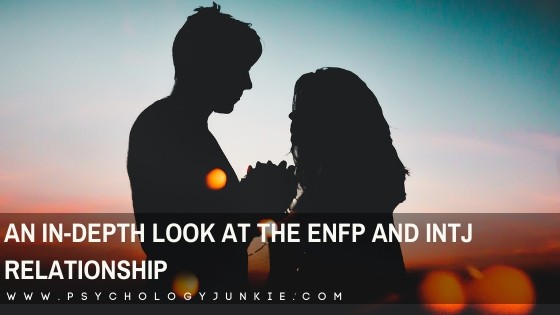
Not sure what your personality type is? Take our new personality questionnaire here. Or you can take the official MBTI® here.
Table of contents
Estimated reading time: 17 minutes
Why Do ENFPs Fall for INTJs (and vice versa)?
ENFPs and INTJs may only share one letter preference in common (N for intuition) however, they share two common cognitive functions; Introverted Feeling and Extraverted Thinking (see below).
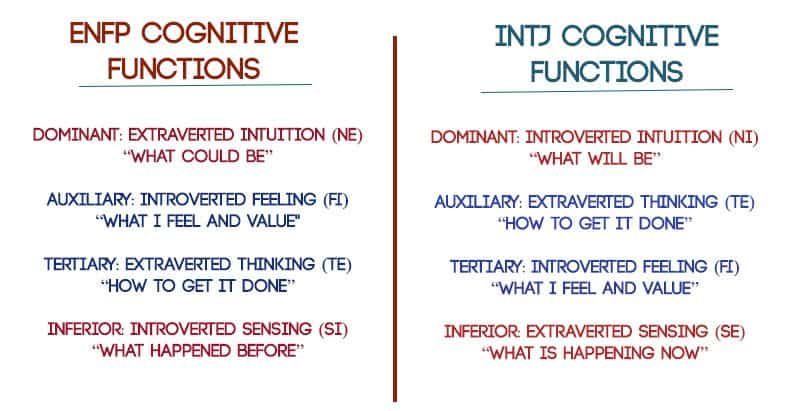
This means that both ENFPs and INTJs not only perceive the world through intuition, they also have a common feeling and thinking function, although in a separate order. Where the ENFP will have higher knowledge and awareness of his/her own emotions and values, the INTJ will have a higher awareness of logic, structure, and efficient task completion. If you look at the cognitive function image, you can see that INTJs use Fi in the tertiary position, only one step down from the ENFPs position. The same goes for Extraverted Thinking, the ENFP has Te in the tertiary position, only one step down from the INTJs Te.
What Does This Mean?
INTJs and ENFPs are going to hit it off and experience a natural spark because they will both live and thrive in the world of ideas, possibilities, and meanings. They will feel a nearly “inside out” approach to intuition. The INTJ will have a singular focus, intense and deep, although they may think about more possibilities than they say. The ENFP will have a broad focus, seeing numerous possibilities everywhere. The INTJ may feel that the ENFP is speaking out loud intuitive thoughts and feelings that they have internalized. The ENFP may feel that the INTJ is grasping a deeper and more focused approach and insight into their ideas and possibilities, causing them to have a clearer focus and perception themselves.
Life is full of possibilities and excitement for the ENFP, and they have an infectious enthusiasm that draws the INTJ in. The ENFP can open up the INTJs mind to numerous possibilities and angles they may have missed before, and the INTJ can harness the ENFP’s ideas and insights and give them a clearer focus along with a plan to make them come to life. The ENFP can be a constant idea-generator whereas the INTJ can be the one who harnesses the best of those ideas, creates the plan, and together they bring the idea to life. Both partners are going to be focused on the big picture, the future, and they are going to be excited by underlying meanings, symbols, and possibilities.
Benefits of the Thinking/Feeling Difference

This difference can create a spark of interest as each one is strong in the area the other is weak. This can also be a source of frustration (as we’ll discuss later). INTJs are drawn to the ENFP’s warm, outgoing nature, and enthusiasm. ENFPs are naturally playful, open-minded, and blessed with a good sense of humor. INTJs find in the ENFP a warm, comforting, and delightful friend and partner. The ENFP partner can help the INTJ to get a better grasp of their own feelings, values, and emotions.
ENFPs, in turn, are drawn to the INTJs resolve, intellectual passion, and driven nature. INTJs have an intense focus and a natural efficiency and goal-oriented nature that is captivating to the ENFP. The INTJ can help the ENFP to be more objective in their decisions and give logic-driven perspectives that may help the ENFP to further achieve their dreams.
Benefits of the Judging/Perceiving Difference
ENFPs are attracted to the INTJs resolve and commitment. INTJs are very single-minded in their vision and are determined to meet their goals. They have a strong ability to hold their ground and stick to their schedule and plan without being swayed. This is admirable to the ENFP, who often feels tossed and turned by their many ideas and visions for the future and has a harder time settling on just one. The INTJ can help the ENFP stick to a time management plan and can make their dreams more of a possibility with their efficiency at setting up plans and timelines.
In the same respect, INTJs are attracted to the open-minded and inspirational nature of the ENFP. The ENFP can introduce new angles and perspectives that the INTJ in their intense, single-minded vision may have missed. In their singular focus and their penchant for efficiency, INTJs can miss details or alternatives that can greatly improve the creativity and excellence of their work. ENFPs can help broaden their scope and together they can achieve almost anything they set their minds to.
Benefits of the Extroversion/Introversion Difference
ENFPs are considered one of the least extroverted extroverts, and for this reason, there’s not as big of a contrast with this pairing as there would be with an INTJ and certain other extroverts. You can see this in the MBTI® Manual in a section about the different types and their values. A national sample was asked to indicate how important 11 values were in their lives on a scale of “Very important”, “Somewhat Important”, or “Not Important”. ENFPs listed Autonomy as their fourth most important value. ESTPs and ENTPs are the only other extroverts who listed autonomy as one of their top 5 most important values. ENFPs shared autonomy as a value with INTJs, along with home/family, health, and financial security.
The INTJ can really enjoy the ENFPs extroversion. That whole opposite attraction has a strong pull here! INTJs are fascinated by the ENFP’s ability to liven up the atmosphere and are impressed by their skill at connecting with people in an insightful way.
ENFPs, in turn, are attracted to the quiet, intellectual nature of the INTJ. In the INTJ they find someone calm and sage-like to come home to. They can enjoy curling up with a good book together, or discussing all their ideas and dreams over a cup of coffee. There is something perceptive and intense about the INTJs quiet, focused nature. ENFPs are also very intellectual, so these two types can really get into some fascinating, drawn-out conversations about the meaning of life, philosophy, or any other number of topics.
The Struggles of the ENFP/INTJ Relationship

One of the biggest struggles with the ENFP/INTJ relationship is their different social needs. Yes, ENFPs are less extroverted than many, but they still greatly desire interaction with the outside world. They are stimulated by meeting new people and experiencing new atmospheres. These interactions trigger their Intuition and allow them to be inspired. They will feel stifled if they are cooped up too much in the house and not allowed to meet new and interesting people or experience and explore places they’ve never been before.
INTJs have dominant Introverted Intuition. They need a lot of time alone; in fact, they are one of the most introverted introverts. In order for them to really be in their element as Ni-dominant individuals, they need plenty of space, quiet, and tranquility. They will feel caged in and over-stimulated if they have to spend too much time engaging with others. They especially hate interruptions to their projects, whereas ENFPs are often excited by interruptions and distractions and see them as an opportunity to explore something new. INTJs can enjoy visiting new places and seeing new sights, they can even enjoy the occasional social outing, but they need to be allowed much more time to recharge than many other types.
Roadblocks in Communication
Communication struggles can also be an issue in this pairing. ENFPs are very concerned with harmony and will try to avoid conflict as much as possible. They tend to take criticism personally and may want more positive affirmation than the INTJ naturally provides. INTJs tend to be blunt and straightforward with their criticisms, and they can unintentionally hurt their partners’ feelings.
ENFPs, as extroverts, tend to process their thoughts out loud most of the time. Because their dominant function is Extraverted Intuition, they may want to ‘talk out’ their ideas, their insights, all the possibilities around them. They may also want to be checking in regularly on their partner to make sure everything is good in their relationship. The INTJ, in reverse, internalizes many of their thoughts and ideas and tries to stick to one idea and get rid of any distractions to that idea. The ENFP can seem intrusive to the INTJ and the INTJ can seem cold and harsh to the ENFP when their communication preferences collide.
INTJs also don’t share their feelings as readily as ENFPs do. The ENFP is much more aware of their feelings because introverted feeling is their second most conscious function. INTJs, in contrast, are less aware because introverted feeling is in their tertiary position. It can take them a while to really understand or pinpoint how they feel and so they can feel irritated if the ENFP is regularly asking them about their feelings or asking them to exhibit emotions that don’t come as naturally to them. This can cause the INTJ to feel pressured to regularly be accessing a function that isn’t in their natural comfort zone, and this can also cause the ENFP to feel that they can’t connect emotionally as much as they would like.
One upside to the feeling/thinking difference is that in mid-life most people develop their tertiary function quite a bit. This means that the INTJ will be developing Introverted Feeling in their thirties and forties, and the ENFP will be developing Extraverted Thinking in their thirties and forties. As a result, if these couples can stick it out they often find themselves forming new bonds in mid-life and being able to express themselves better to each other.

Different Planning Styles

As perceivers, ENFPs like to keep their plans open-ended for as long as possible. They like to have the freedom to cancel, switch plans, or spontaneously do things as inspiration strikes. They love surprises and tend to be impulsive. One of the great things about this quality is that it allows them to find new inspirations for their life and their projects that they might have missed otherwise. However, this can cause clashes with the INTJ.
The INTJ is far different in their planning style than the ENFP. They like things to be planned out ahead of time, and they like to have closure on all their decisions. Leaving things open-ended stresses them out, and they usually hate surprises. They enjoy having a structure in their life, knowing what to expect, and having everything organized and neatly planned. As a result, these partners can wind up driving each other out of their respective comfort zones, creating chaos and conflict.
This difference can, at times, be a good thing. The ENFP can help the INTJ to see new perspectives and introduce them to new experiences they may actually enjoy. The INTJ can help focus the ENFPs ideas and find a sense of calm and direction in their life.
Overcoming the Struggles in an ENFP/INTJ Relationship:
For the ENFP Partner:
Give your partner plenty of time to think and be alone with their musings. Steer clear of interrupting them, as interruptions are a huge source of frustration for INTJs.
Respect the INTJs need for routine and planning and try not to cancel too many plans at the last minute.
Try to take an interest in the things that your partner is interested in. Chances are, this can be the source of many amazing conversations and a greater friendship.
Understand that when your partner gives criticism they aren’t trying to hurt you. They naturally see flaws and things that could be improved, but they mean no ill-intent by offering advice or saying what they think should be changed. If this does bother you regularly, just tell them. Make sure they know and try not to hold in bitterness regarding this.
Try not to push your partner into too many social situations. Small gatherings with just a few close friends are almost always preferred by INTJs. If you feel the need to socialize more but your partner isn’t interested, feel free to go out and socialize without them. This way you get your energy needs met without pulling the INTJ out of his/her source of energy (introversion).
Try to follow through on things you say you’ll do and try to be on time to any dates or appointments you’ve made.
Don’t expect the INTJ to be spontaneous often. Try to schedule in time for special things you want to do together so they aren’t caught off guard.
Try to open your mind to the perspective the INTJ is offering. They have a great ability to stay objective and see logical, efficient ways to get things done. If there’s a decision you’re struggling with, the INTJ can be a wonderful confidant and advisor who will give you an objective and insightful answer. Ni-dominant types are great at knowing what steps to take to achieve a future outcome. Definitely take advantage of this unique ability of theirs!
For the INTJ Partner:
Try to respect your partner’s feelings and emotions, and try to be as open about your own as possible.
Try to make time for social engagements now and then. It’s more comfortable to retreat into your own private space, but it can make the ENFP feel lonely. You don’t have to overdo it, but going to an occasional social event can help to make your ENFP feel loved and happy to be able to share that experience with you.
Be especially attentive when your partner is sharing their emotions.
Try to give positive affirmation to your partner regularly, especially when they do something nice for you.
Emphasize positive aspects of your partner before giving criticism, and remember that they tend to take criticism personally so try to give it gently.
Be upfront and open about things that bother you so that you don’t let things simmer inside for too long and then explode. Try to express your needs, especially when it comes to planning things or getting some time alone.
Try to open your mind to the perspectives the ENFP is offering. Ni-dominant types tend to have an intense focus on one way to get things done, or one project and they can be irritated by deviations from that plan (I know, I’m an INFJ), but try to take a moment to really listen to what the ENFP is saying. ENFPs are incredible at seeing creative and imaginative alternatives and possibilities. They may have an insight or idea that could really improve your life!
The Feeling Male with the Thinking Female

Female INTJs and male ENFPs enjoy a very unique bond, but there are some special qualities to this particular relationship. Female INTJs often face many societal pressures to conform to a more ‘feeling’ role. Men, likewise, are often pressured to conform to a more ‘thinking’ style. These two types often face difficulties growing up, possibly being made to feel that they are somewhat inadequate. The woman may be told she’s not ‘ladylike’ or nurturing enough, and the male may get told he needs to ‘man up’ more because he happens to show emotions. In relationships, it’s important to be aware of the difficulties that each type may have faced because of outside pressures. ENFP men may have had to stifle a lot of their emotions and sensitivities because of external pressures, and INTJ women have probably had to develop a more feeling type of role. As a result, many ENFP males seem less ENFP-like than ENFP females. In the same respect, many INTJ females seem less extreme in their INTJ nature externally than INTJ men.
“I get told I’m too sensitive a lot, and people conclude that because I’m a man showing emotions that I’m a “wimp”. ENFP men are not wimps. I can provide plenty of intellectual stimulation and I’ve overcome a lot in my life. I feel a great pressure not to talk about my emotions or feelings, and I hope that one day when I’m in a relationship I don’t have to do that anymore. That I can just be me.”
– Ethan, an ENFP male
INTJ women face many of the same struggles.
“I was raised in an ultra-conservative and traditional family where women were supposed to be the nurturers and empaths. Not only were those seen as feminine traits but it was assumed that a girl would have and be drawn to only certain things because of her sensitive and emotional nature.
This never felt like it fit me and made me feel something was wrong with me.”
– Rebecca, an INTJ female
It’s important to be aware of the issues these two types face so that both partners are aware of the obstacles they may have had to overcome. It’s important for both types to allow their partner to be exactly who they are, and not feel stifled or that they have to bury parts of themselves anymore. A happy relationship is built on trust, and part of that trust is being able to know without a doubt that you can embrace your personality wholeheartedly without fear of judgment. This means that it’s especially important to not make fun of things you see your partner doing that don’t fit your mental image of what is ‘ladylike’ or ‘manly’. ENFP men can be the ones to not push the INTJ female into a cookie-cutter, sensing feeling role. INTJ women can be the one who understands that the ENFP male has a strong emotional intelligence and appreciate that about them fully.
What Do You Think?
Do you have any thoughts to add to this article or any suggestions for ENFPs and INTJs in a relationship? Let me know in the comments.
Find out more about your personality type in our eBooks, Discovering You: Unlocking the Power of Personality Type, The INFJ – Understanding the Mystic, The INTJ – Understanding the Strategist, and The INFP – Understanding the Dreamer. You can also connect with me via Facebook, Instagram, or Twitter!

Other Articles You Might Enjoy:
10 Things That Excite the ENFP Personality Type
10 Things That Excite the INTJ Personality Type
What You Need to Know Before Dating Any Myers-Briggs® Personality Type
All About INTJs
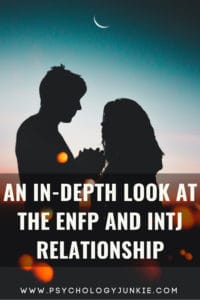
Subscribe to Our Newsletter

Want to discover more about personality type? Get the inside scoop with Susan Storm on all things typological, along with special subscriber freebies, and discounts on new eBooks and courses! Join our newsletter today!


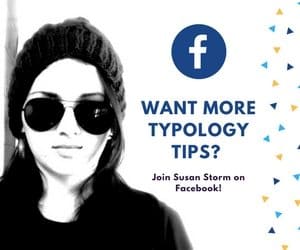
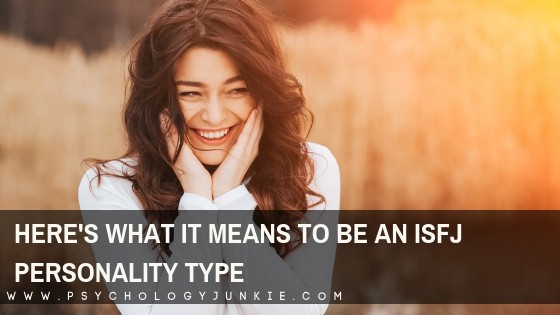
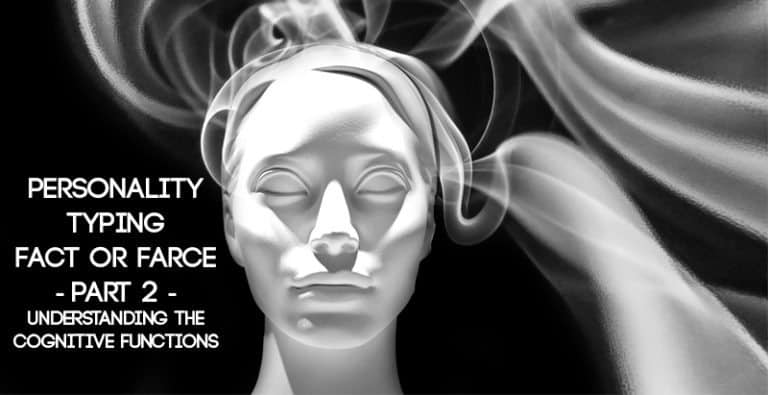
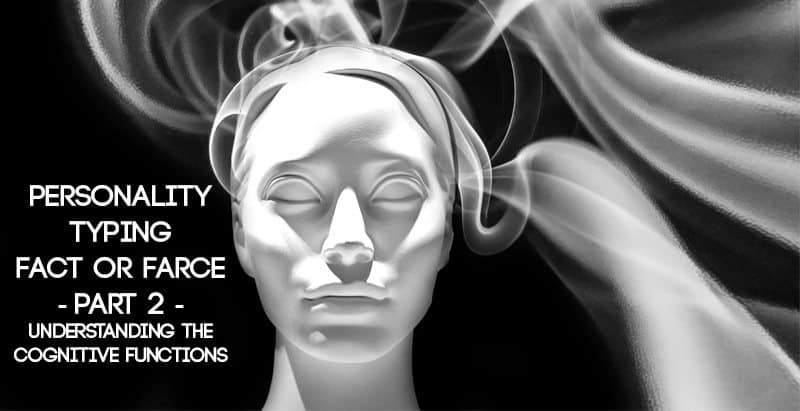


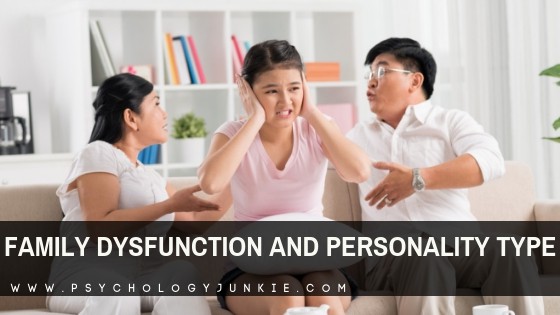
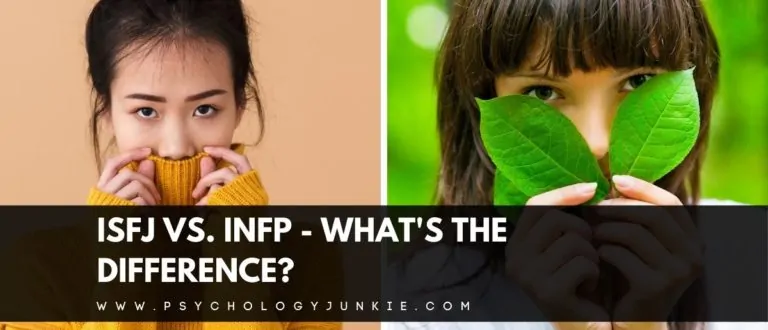
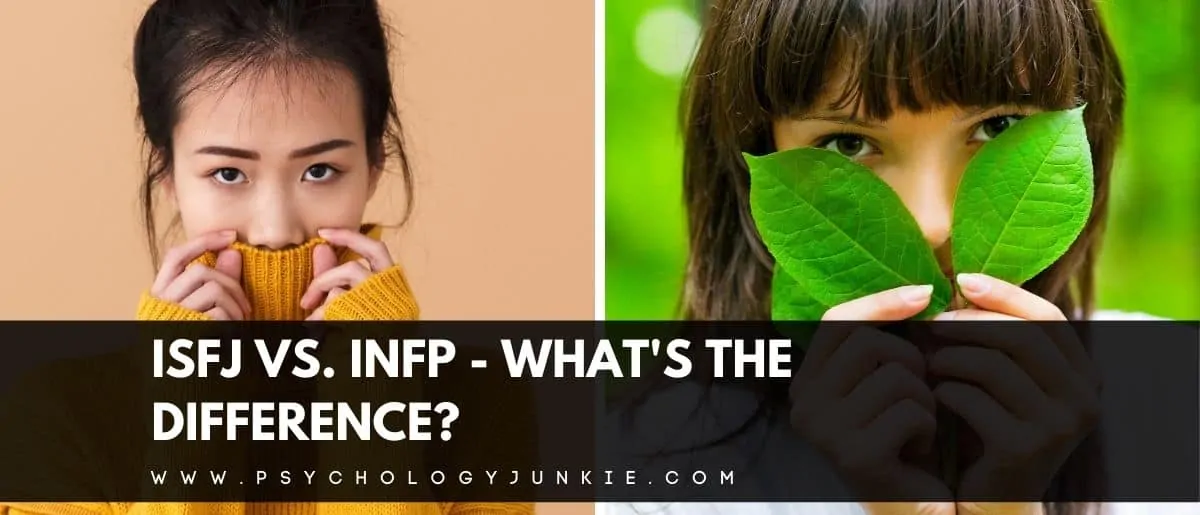


This is an incredible article. I am an INTJ and by boyfriend is an ENFP. This article describes us exactly and makes me feel much more comfortable moving forward with him. I now know why we clash when it comes to certain subjects but gives me hope that we can find common ground.
I wish the opposite would’ve been explained – an ENFP female & an INTJ male at the end of the article. Only one side was projected. I’m an ENFP & my boyfriend is an INTJ. We care about each other a lot but we need guidance. Thank you! The article was pretty accurate & helped me understand him better. We are both in our 60’s and want to make this work…
My wife in INTJ and I am ENFP. I recently learnt about attachment theory and personify types among other things. Seems logical that an INTJ has an avoidant attachment and I the ENFP has an anxious attachment style. We have been together 25 years and it has been a roller coaster to say the least. The love can be intense and the heartbreak as intense. I read with exhilaration the “anxious / avoidant dance” as we have done so for years now. It was actually relieving to read that our life was almost a playbook and we played the starring roles perfectly. I push and she pulls, so I push more and she pulls further. Anyway knowing that we both have issues is one thing. Getting my INTJ wife motivated to address the issues we have, so far impossible. We past breaking point too long ago. By me the ever optimist ENFP looking for any glimmer of positivity in the harsh critical marriage keeps rolling over to keep the peace. So many boxes ticked in the above article, add in there abandonment issues and being hyper sensitive and wow even more boxes ticked. The positive side, that’s hard right now, we have just separated. I wish they taught this stuff in schools. Emotions and feelings are so important.
My hubby & I are the same as you were: he’s ENFP, I’m INTJ. (And I’m typing on a phone so this won’t be a perfect reply..)
I feel for you. We’ve been married for 13 mostly difficult years but have had some really amazing times & connections. He’s 9 years older than me & we married when I was 27 & already had a 7 year old son so there was a little bit of stress involved or too many changes for me in too short of a time while I was trying to solve world peace in my head. Add in severe financial issues shortly after we married and we both were just trying to survive. Fast forward to now & it’s settled down but we both still have times of doubt & we have to be careful not to hurt one another. Often I think he worries that he won’t be “enough” for me. And in the last year I finally decided just to be honest about what I had figured out about myself….. that is, he most likely won’t be “enough”, but he is always enough when i am with him. Sometimes I can’t have him all the time, it would drive me nuts even though I miss him or I feel horrible that I’d rather be alone. And I realize if I don’t find the mental stimulation somewhere else that I’ll take out my frustration on him for making me only give my attention to him. And then I feel like I’m defying the natural order of society by being honest (my family is mostly conservative & I’m a free thinker. ) I practiced with something like “I NEED that mental stimulation, & it needs to be about what I’m interested in, which isn’t always what you are, & that’s ok, isn’t it? And yes I get along better with guys, always have, less drama & yes, I get excited when I am mentally stimulated & guys take that connection too far at times, & no I have no idea how to deal with your jealousy though I mostly understand it.” And that’s pretty much where we are now. Communicating better for the first time since we both just held on and tried to get through it. We’re both making an effort though I’m very concerned that the truth is that I’m not enough for him. He may truly need more attention from me while I can just find more mental stimulation from other sources when he’s not able to provide it & then he will get jealous of that. I feel like we may be at a standstill in our relationship growth if we can’t find a solution. And we both crave moving forward, or at least thinking/ feeling we are & will get tired of running in circles. I have pretty good stamina though if I have even a sliver of insight that might shed ideas into my head & thus give me hope for the future. Then I’m able to give my ENFP hubby hope for today.
So if you’re out there and anything you read sounds the least bit familiar, can you offer any insight? Anyone?
Hey,
I’m an ENFP dating an ENTP, in a LDR… We used to talk about all the things. ALL. THE. THINGS. And he recently found an online group of people that better meets his mental stimulation needs than I do… And I’m insanely jealous. He talks to a lot of women. I’m insanely rage jealous. One of them has the audacity to be amazing and intellectual and they were attracted to each other… And he fessed up about it after they’d been talking for 5 months… I’m having a wicked hard time getting over that.
But he keeps insisting he wants to be with me and no one else…
I feel set aside.
I miss him
I’m driving him away with my neediness
I’m angry about where we are
I don’t know how to fix it
All that to say… If he would just take a break and be with just me for a bit. Let me come to terms with things without the abrasion being ever present. I’d really appreciate that.
As it is, the distance is so painful, and the emotional pain is so much… I’m sure that sounds dramatic, but it really does hurt.
Also… The ENFP probably does not want to spend time with other people, right now, because they want you… But it would help if they did get out… Except that it’ll feel like they’re being pawned off on other people and they want you… That’s how I feel.
I swear… If I could just have a few weeks with just him, I’d feel better. I need that
I hope you guys can come together.
Good luck
Wayne, I would also like to ask if you’re wife was mostly just “disinterested” in some type of therapy or working through issues OR was it something she would just never do? Personally I wouldn’t do it if I wasn’t intellectually interested in it which is usually because I don’t currently see that it would be effective. It doesn’t mean it wouldn’t be in the future & I always recognize this can change. I get around this with those I love by really getting involved with thinking about what the goal is and what information I’ll need to get there. If it’s not interesting & seems dull then I often won’t want to do it, though I will if pushed enough….. the only exception would be if it’s dull AND emotionally difficult AND seen as ineffective. Nope, count me out. I’ve literally had to come up with games I play with myself about our relationship so I can measure it & guage if it’s getting better overall, and experiments, etc. It’s not that I’m cold, or I wouldn’t try so hard to maintain mental stimulation about something that does bore me sometimes….
If you want to answer if she was just disinterested or truly just too hurt at this point in time I’m all ears. I’m very intrigued & also feel like we could help each other.
Best article on the internet. I’m an INFJ and my husband is ENFP. Every word in this article is so true.. exactly explains our relationship.
I absolutely loved this article, it was so spot on. I am an INTJ and my husband is an ENFP, and we actually got married the date of this article lol! There was an instant attraction and spark ever since we became friends and through the years of knowing him I have loved that we make each other better and that our differences only strengthen our relationship. We just had our first daughter and I am excited to see how our different personalities come into play as parents. We have definitely had our ups and downs, but I have never had a more fulfilling relationship. It is definitely worth it working through our problems.
Enfp male, intj wife. Wonderfully analytical article. This should be required reading for all such couples.
I’m so glad you found the article helpful – thanks so much for your kind comment! – Susan
As I have started to learn more about Meyers- Briggs, I strongly disagree with the theory of ENFPs matching best with INTJs. I am an ENFP who dated an INTJ for two and a half year, ending in a broken engagement because of our differences. While we loved discussing intellectual topics in the earlier stages of our relationship, as time passed, we often would be communicating on two entirely different planes. He could not understand my more colored and emotional prospective, while his straightforward way of looking at things was helpful at times, but also frustrated and constrained my thought process.
Also, as is common with INTJs, they are very critical and straight forward with this criticism. They criticize in the hopes of bettering their partner. However, ENFPs are people pleasers, want to make their partner happy, and take criticism to heart. I often felt I would hear many negative comments or critiques but this was never countered with positive affirmation and with time became discouraging.
ENFPs are also extremely affectionate and playful. INTJs can not meet this in kind, which puts the ENFP in the position of being the nurturer for the majority of the relationship. The ENFP will not receive the type of affection and care they crave, while the INTJ will not receive the logic and intellectual discussions they desire. Ultimately, leaving both partners unsatisfied.
Plus, add on that both partners are lawyers and you have a whole big mess!
As an INTJ male I find your comment to be most enlightening, thanks for sharing. Also as an INTJ I really do not see the appeal of an opposite personality. We find relationships hard enough without having to deal with foreign idiosyncrasies. Don’t take that personally its just my blunt nature. (grin)
i am an intj male married to an enfp female. both of us grew up in dysfunctional environments, me without my mother and growing up with an alcoholic father( no offense intended to him. he did his best) and she grew up with a paranoid schizophrenic mother who was an alcoholic and was molested by her brother. She went through 3 marriages before me with the first husband nearly beating her to death. no children from those btw. When we met neither of us was looking, it was fate. ( in retrospect we discovered we had 3 seperate mutual acquantances that had been trying to get us together for over 5 yrs.) It was love at first sight . I was lonely shy and scared of being used and i felt her presence was like an aspect of nature itself calling from a half remembered dream. I KNEW i had met my wife and 6 months later we married. We have been together 25 yrs with 3 wonderfully adapted children in spite of our collective pasts. She has had problems with anxiety and depression her entire adult life not to mention inflammatory breast cancer at 37. I brought some strange mix of self obsessed immaturity (me first) and passive manipulation (bcos i knew just how smart i was) into the relationship but we survived this and addictive issues that we are still coping with. Our big turn around had to start with me. I had became overly sensitive emotionally in my attempts to understand and please her and this culminated in my attempted suicide when i realized i had married my father ( I would never amount to anything, i was a jinx ) As I recovered I realized where it got screwed up and accepted full responsibility . I turned off those reactive emotional switches. I still have emotions but now they are genuine, embracing the sorrow and joy of every situation. It has to start with the male. If he is not being a truly self realized and aware human being then the female will begin trying to perform his role as well which always leads to mom telling you what to do. If the male begins to fulfill his role then things can BEGIN to change for the better. Unlike most intjs i have a deep abiding interst in esoteric /occult/spiritual matters. I was drawn to this as a child. I also have a keen insight and education in quantum physics. In my research into spiritual matters I have seen the connections between these two opposing areas and I must tell you there is no opposition. Its all right here in front of everyone at every moment but its up to us to materialize it. You have to walk the path to know the path.
Relationships are not only between romantic couples, one of my best friends is INTJ and I am ENFP.
This article completely defines our relationship. I do love how well it is explained.
I must say though that for people that feel they collide with their opposite and see it no posible outcome…. They might be to enclosed on their own traits not seeing the beauty of the personal growth that a different type can actually let you get.
Also this personality traits do not explain very well where a person is in its personal development. It could be that they are not in a very healthy level of development, which means their weakness and fears will be stronger than the good traits of their personality.
I do recommend reading into Enneagram personality types to get a deeper understanding of yourself, your partner/colleague, and your personal development.
What is it that work for some and not others???
You will probably find it there.
This is spot on. I’m ENFP, my husband INTJ. Married 12 years. My 3rd his 2nd. I’m in my 50’s he in 60’s. We have 2 children each from first marriages. 6 collective grandkids.
He gets me! Until I read this article I never understood why we work together so well. He tells me often, he loves how I can make any situation positive. I tell him how much I admire his ability to know exactly how to keep me on track. The list is long on our compatibility. Our one routine that we hold sacred is our morning coffee. We have been raising 2 of my biological grandkids for almost 2 years. He is the one who keeps us focused and organized.
I could go on and on.
I read the previous replies. It’s not just the personality types. It needs to be the right person. Just know if it takes too much energy to try to make it work, it’s not the right one.